I was sitting in shul yesterday morning, bright and early at 7:30, early enough that most of us typically just nod an almost silent “Shabbat Shalom” to each other until we’re more awake. (A few of us actually bring our coffee to shul.) A couple of minutes after I got seated, a friend of mine walked by me, but then stopped and turned around, and said to me, with no prompt: “My Holocaust survivor father is looking down on us, I’m sure, and is saying, ‘Good for you …. you’re returning to yourselves.’”
I don’t know what his father is or isn’t thinking, but I do know that that sentiment is prevalent not only among Holocaust survivors who are no longer with us, but right here, among us still living. No one takes any pleasure in the inevitable (but infinitesimally small) number of uninvolved victims, but everyone I know took some degree of pleasure from seeing the old Israel emerge to the surface once again. Finally, not the Israel that got overrun and mercilessly slaughtered on October 7, or the Israel that’s been in a useless almost-year-long war of attrition with Hezbollah since October 8, but the Israel that executed the greatest Trojan horse operation since the Greeks got their wooden horse into Troy thousands of years ago.
Israeli social media, to which we’ll return, was flooded with humor about the two days of attacks—mostly because it felt good, for once, not to be on the defensive.
What’s the actual impact of the operation? Those of us without the right security clearance can pontificate all we want, but bottom line—we don’t know. How many Hezbollah operatives were killed? How may thousands were badly maimed and put out of business for a while? How many were higher ups? Will rank and file Hezbollah fighters be slightly deterred by the knowledge that there are no empty hospital beds in Lebanon should they get injured? It’s hard to know all that.
But what we do know is this … little by little, through targeted killings and operations like the beepers, we’re gradually picking off their leadership. Here are two charts that the IDF released in the past few days:
Hassan Nasrallah, figuring out what his next steps are, is missing most of the people he used to trust for making tough decisions. That’s fine with us. And it probably makes Ali Karaki just a bit nervous. That’s fine with us, too.
And as for the leadership of the Radwan force, they didn’t have a good day on Friday in Beirut. We can live with that, too:
With the north heating up, schools from Haifa and above closed and large public gatherings no longer allowed, it’s clear that some major development in the the north is not out of the question. So much of this week is up in the air.
But for the time being, here are our tentative plans for this week:
SUNDAY (09/22), today: The beeper operation, and how Israeli humor which flowed from it sheds some light on our desperate need to feel we’re turning a corner.
MONDAY (09/23): There are tunnels and there are tunnels …. I was recently privileged to see some new tunnels opened up in the City of David, which affords us a reminder of who we’re fighting, and what we’re fighting for.
TUESDAY (09/24): The Rosh Hashanah liturgy, immediately after the blowing of the Shofar, says of RH that “today is the birthday of the world.” That notion is reflected, I’m sure unintentionally, in an exhibit of new October-7-related art at Tel Aviv’s Imperial Hotel, which includes a piece called “Press here to restart the world.” We’ll look at the exhibit and what it says about Israelis’ souls today.
WEDNESDAY (09/25): Strangely, there are very few books in Hebrew about liberalism. At a time in which liberalism is on the defensive all of the West, that’s not good. We meed with Dr. Tomer Persico, a highly regarded Israeli intellectual and writer, and hear about his new book on liberalism, and why he thinks it matters to Israelis society.
THURSDAY (09/26): The ongoing memorial “sticker project”: We’ve mentioned the phenomenon of Israelis memorializing those they lost on October 7 and in the war that followed through stickers, with photos of their loved ones, a favorite quote of theirs, etc. Those projects are getting more exposure on social media, and we take a look at that.
As the High Holidays approach, our tentative schedule:
Week of September 29: We’ll post the first part of the week, before Rosh Hashanah; podcast for paid subscriibers will be posted on Tuesday.
Week of October 6: Yom Kippur isn’t until the end of the week, so we will post most days, including a good deal of material devoted to the anniversary of October 7
Week of October 13: We’ll post the first part of the week, before Sukkot
Week of October 20: A very light week because of Sukkot, but of course we will address the anniversary of Simchat Torah.
Back to today’s content:
It may well be that the impact of this operation is greater than many people imagine. Some experts argue that we might have changed the balance of power for a few weeks, giving Israel a window it needs if we’re about to open up the northern front (still not clear). Here’s a short piece from a Times of Israel article sharing the views of Refael Franco, former Deputy General Director of Israel’s National Cyber Directorate and head of its defensive measures:
Aerial strikes, though they have a range of beneficial effects for Israel, only go so far to restore deterrence. Hezbollah has weathered Israeli airstrikes for decades, and designed its military force with the expectation that it would have to withstand weeks of bombing. “Bold, unusual [action], that’s how you get deterrence,” said Franco.
Now, he said, Israel has a window of several weeks in which it can decide whether it wants to escalate into a full-scale war or pressure Hezbollah into a diplomatic arrangement.
“The idea that Israel only had a 48-hour window to take advantage of the attacks is nonsense,” he said, pointing at the enduring effects on command and control and citing chaos in Hezbollah’s ranks.
Moreover, if Hezbollah wants to exact a measure of revenge on Israel — as Nasrallah has threatened — the aftermath of the attack is “not a good situation for it,” Franco argued.
Yet whatever relief people here might be feeling, the underlying heaviness hasn’t gone anywhere. You get a sense of the mood here from the random comments that people make, like about their Holocaust-survivor fathers no longer with us, or even right before the Torah reading.
Back to yesterday morning at shul. We got to the part of yesterday’s Torah reading called the Tokhekah (“the curse”) [Deut. 28:15 ff.; translation below is not from Sefaria, but from Robert Alter’s translation], typically read in a softer voice, when someone leaned over to me and said, “We really don’t need to read this, this. year. We’ve been living through it.”
Here are some parts of the text from Deuteronomy. The similarities to our past year are chilling.
25The LORD will render you routed before your enemies. On one way you will sally forth toward him, and on seven ways you will flee before him. [Think of all the lands we’ve fled, where our citizens can no longer live.] And you will be a horror to all the kingdoms of the earth. [Think of Israel’s diplomatic isolation] … 29And you will grope at noon as the blind man gropes in darkness [Recall the stories of families who spent 15 hours in safe rooms that were literally pitch black, in some cases only to be killed at the end of those hours]. 30A woman you will betroth and another man will bed her. [How many engaged young women lost their finances? I don’t know the number, but it’s huge.] A house you will build and you will not dwell in it. A vineyard you will plant and you will not enjoy its fruits. … 32Your sons and your daughters will be given to another people with your own eyes seeing and wasting away for them all day long, and your hand will be powerless. [It’s too horrible to comment on.] 33The fruit of your soil and all your enterprise a people that you knew not will eat up, and you will be only exploited and crushed always. 34And you will be crazed by the sight of your eyes that you will see.
… 37And you will become a derision, a byword, and an adage among all the peoples where the LORD will drive you.[Think the Hague, or the United Nations, or American university campuses] …
41Sons and daughters you will beget, but you will not have them, for they will go off in captivity. [There was an eerie silence when that verse got read] …
52And [your enemy] will besiege you in all your gates [Hamas, Hezbollah, Yemen, Syria, Iraq, Iran, Judea and Samaria] until your high and fortified walls in which you trust come down throughout your land, and he will besiege you in all your gates throughout your land which the LORD your God gave you. …. 62And you will remain a scant few instead of your being like the stars of the heavens in multitude … 66And your life will dangle before you, and you will be afraid night and day and will have no faith in your life.
Yes, we’ve been living it. Which was why it wasn’t that Israelis “permitted” themselves some humor this past week, but that they desperately needed it. The humor is an expression of their rejection of that last verse above: 66And your life will dangle before you, and you will be afraid night and day and will have no faith in your life. The humor was a small indication that we’re determined, somehow, to get back to normal, an indication that maybe, just maybe, we’re getting some faith that the winds have shifted.
Which is why when I see posts like this on Facebook (in this case from a dear friend who I know cares deeply about Israel), I understand how an American Jew, even deeply committed to Israel, might feel the way that they do, given the nature of American discourse about the conflict.
But I also understand how cavernous is the divide between that world and ours. It’s fine. They live there, we live here. We read a lot of the same news, but almost nothing about our realities overlaps, so almost nothing about our responses will be similar.
Because, actually, yes, when it’s this pinpoint and this effective—yes, we do have to use it. We’d be insane not to.
Almost as soon as news of the beeper operation got out, Israelis posts that I saw were not about fretting about whether or not we should have done it, but instead, giving some credit to the kinds of kids about whom we often chuckle, but who had probably pulled this off.
Here was one that emerged just hours after the attack and immediately went viral:
It’s pretty funny that there’s apparently some 22 year old kid from Haifa named Gidi or Noam or Yohav, spelled with a “heh”, and he has traumas from PE class and his glasses weigh more than he does, and they almost didn’t take him for army service because he’s allergic to gluten and honey, but in the end he did get drafted, and today, thanks to his programming skills, he just blew up about 500 terrorists.
The number of “nerd” posts in praise of the “nerds” was legion. The week might as well have been called “the revenge of the nerds.” Because, actually, when we have the technology to blow up thousands of terrorists with a very, very small number of innocent bystanders also hurt, of course we’re going to do it. Does anyone have a better suggestion for getting the 75,000 homeless residents of the north back to their homes?
So yes, there was quite a bit of humor after the operation, and no, it wasn’t in poor taste. It was simply a people that’s been battered endlessly for a year (not that people in Gaza haven’t also been, obviously), finally feeling that they got some oxygen:
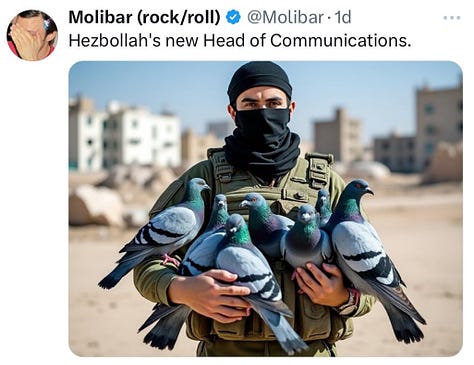
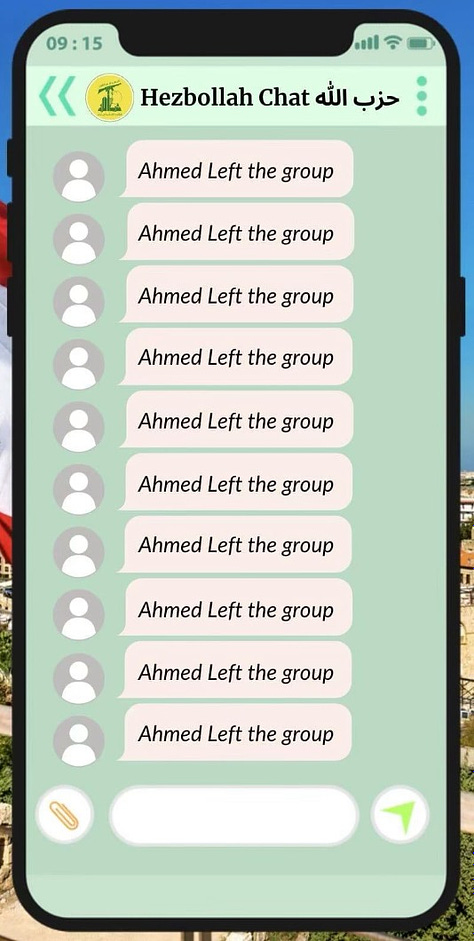
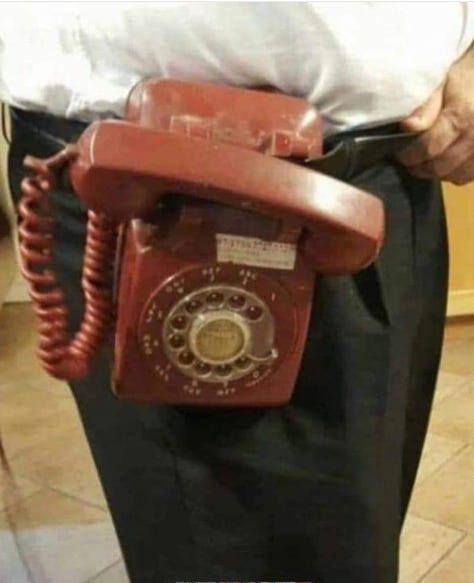
And then there’s that video posted at the very top of this page, of the two Arab guys too scared to use any of their electrical home appliances, which also went instantaneously viral. I first saw it here, and above, we’ve added English subtitles. (I don’t know who first posted it.)
This has the potential to be a long, hard week. It’s hard to know what will happen on the northern border or what will come sailing over it. There are a few scenarios that are very not pretty. Those, we’ll have to handle next.
But for a couple of days, last week, we got a chance to breathe. The old us isn’t gone—If anything, a couple of days last week gave us a few moments to still believe that it’s still possible to “renew our days as of old.”




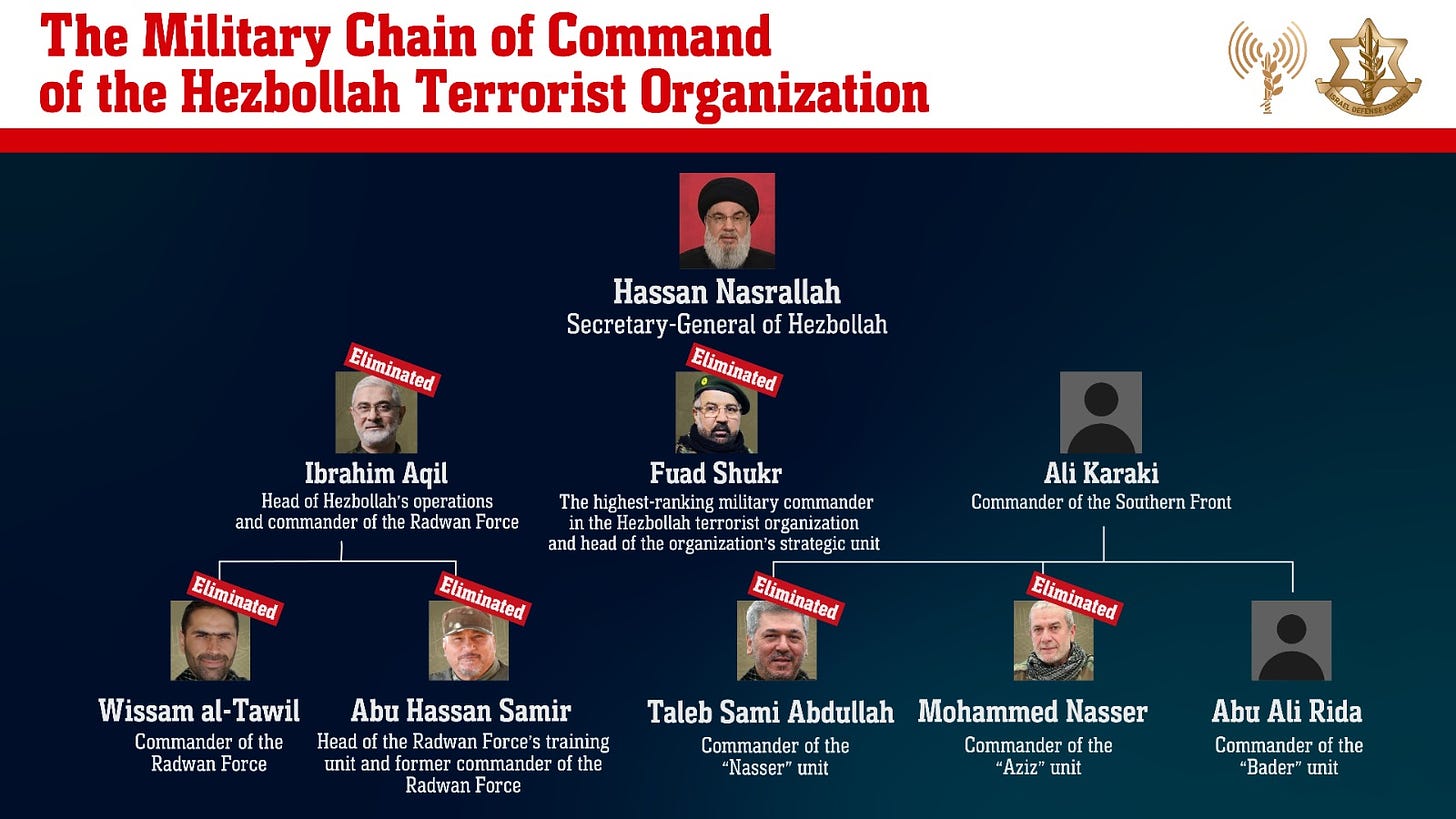
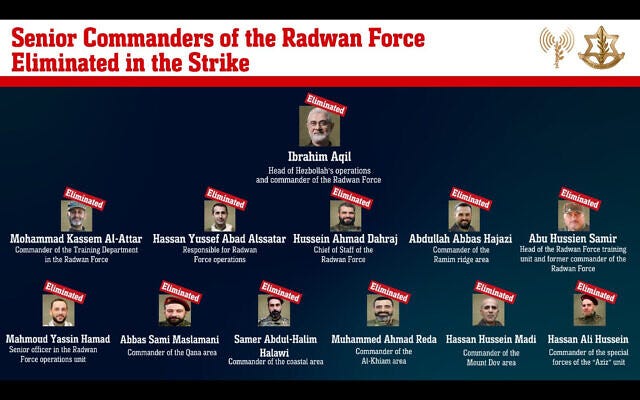


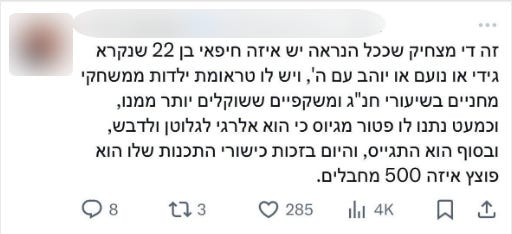
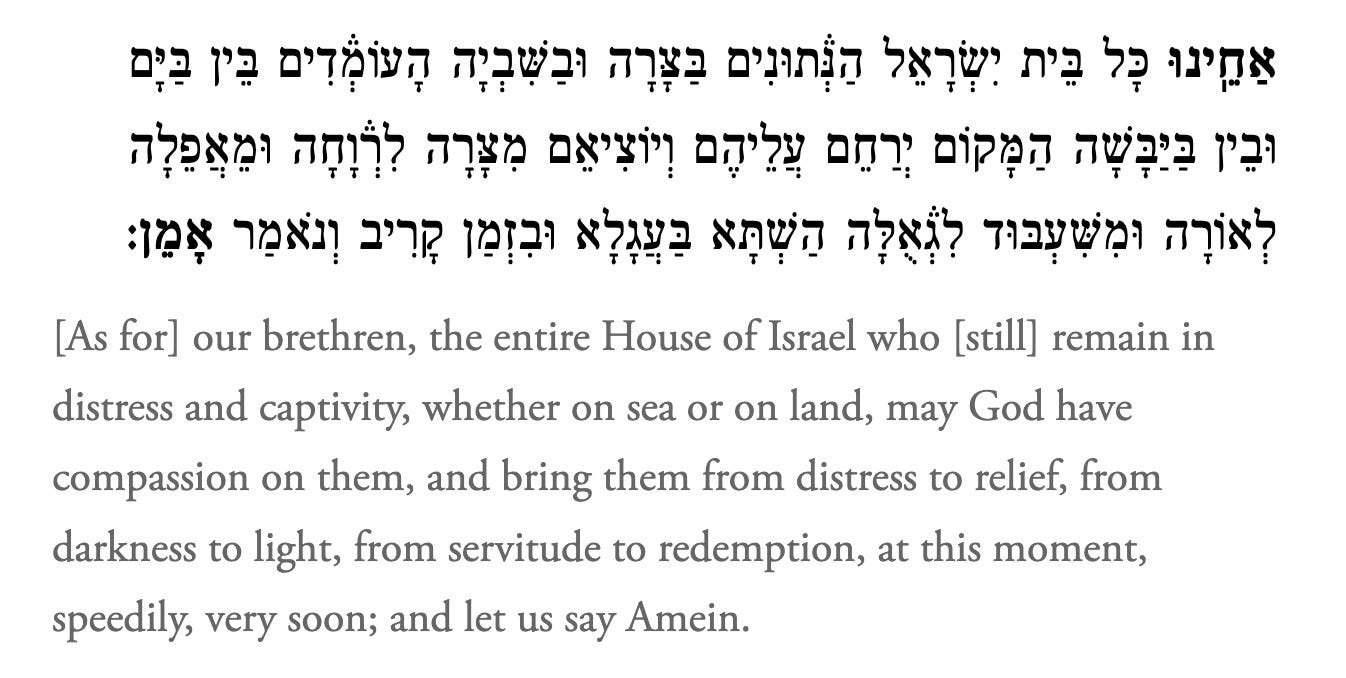








"From the liver to the knee"—edgy Israeli humor stemmed from a deep-felt hope that the tides might just be shifting